- Home
- John le Carré
The Pigeon Tunnel Page 5
The Pigeon Tunnel Read online
Page 5
The exercise in mental discipline had evidently worked, for I don’t remember him fluffing a single shop name or brass plate.
Our meetings over the next ten days were a Cook’s Tour of Westminster’s great, good and not so good. I have a pictorial memory of the faces across the table, and an aural memory of certain voices. Harold Wilson’s I found particularly distracting. Lacking the detachment of the trained interpreter, I was far too interested in the vocal and physical idiosyncrasies of my subjects. I remember particularly Wilson’s unlit pipe and his theatrical use of it as a stage tool. Of the substance of our supposedly high-level dialogues, I have no memory whatever. Our interlocutors appeared to have as light a grasp of defence matters as I had, which was a mercy, for although I had boned up on a list of technical terms from the macabre vocabulary of Mutually Assured Destruction (MAD), they remained as incomprehensible to me in English as they were in German. But I don’t believe I ever had to trot them out, and today I doubt I would recognize them.
Only one encounter remains indelibly fixed in my memory, visually, aurally and in substance, and that was the grand climax of our ten-day tour: putative future Chancellor Fritz Erler meets incumbent British Prime Minister Harold Macmillan at 10 Downing Street.
We are in mid-September 1963. In March of that year, Secretary of State for War John Profumo had made his personal statement to the Commons denying any improper association with a Miss Christine Keeler, an English nightclub girl living under the protection of Stephen Ward, a fashionable London osteopath. That a married War Secretary should keep a mistress might be reprehensible, but not unheard of. That he might be sharing her, as Keeler claimed, with the Naval Attaché from the Soviet Embassy in London was excessive. The scapegoat was the luckless osteopath Stephen Ward who, after a trumped-up trial, killed himself without waiting for the verdict. By June, Profumo had resigned from government and Parliament. By October, Macmillan too had resigned, pleading ill health. Erler’s encounter with him took place in September, just weeks before he threw in the towel.
We arrived at 10 Downing Street late, never a good start. The government car that had been sent for us failed to show up, and I had been reduced to stepping into the middle of the road in my black coat and striped trousers, forcing a passing driver to stop and asking him to take us to 10 Downing Street as fast as possible. Understandably, the driver, a young man in a suit with a woman passenger at his side, thought I was mad. But his passenger rebuked him. ‘Go on, do it. Or they’ll be late,’ she said, and the young man bit his lip and did as he was told. We clambered into the back, Erler gave the young man his card, said any time they came to Bonn. But we were still ten minutes late.
Ushered into Macmillan’s office, we made our apologies and sat down. Macmillan sat motionless behind his desk, his liver-spotted hands before him. His Private Secretary, Philip de Zulueta, Welsh Guardsman, soon to be knight of the realm, sat at his side. Erler regretted in German that the car was late. I seconded him in English. Beneath the prime ministerial hands lay a sheet of glass, and under it, in typed letters large enough to read upside down, lay a prime ministerial briefing paper with Erler’s curriculum vitae. The word Dachau was written large. While Macmillan spoke, his hands travelled over the glass as if reading braille. His patrician slur, perfectly captured by Alan Bennett in the satirical Beyond the Fringe, was like an old gramophone record running at a very low speed. A trail of unstoppable tears leaked from the corner of his right eye, down a groove and into his shirt collar.
After a few courteous words of welcome, delivered with halting Edwardian charm – have they made you comfortable? are they looking after you? are they providing you with the right people to talk to? – Macmillan asked Erler with evident curiosity what he had come to talk about, a question that, at the least, took Erler by surprise.
‘Verteidigung,’ he replied.
Defence.
Thus informed, Macmillan consulted his brief, and I can only assume that his eye, like mine, again caught the word Dachau, for he brightened.
‘Well then, Herr Erler,’ he declared with sudden energy. ‘You suffered in the Second World War, and I suffered in the First World War.’
Pause for needless translation by self.
Another exchange of courtesies. Is Erler a family man? Yes, Erler concedes, he is a family man. I duly translate. At Macmillan’s request he enumerates his children and adds that his wife is also politically engaged. I translate that too.
‘And you have been talking to America’s defence experts, they tell me,’ Macmillan went on in a tone of jocular surprise after another examination of the large print under the sheet of glass.
‘Ja.’
Yes.
‘And do you also have defence experts in your party?’ Macmillan enquires as one beleaguered statesman commiserating with another.
‘Ja,’ Erler replies more sharply than I would have wished.
Yes.
Hiatus. I glance at de Zulueta, trying to enlist his support. It is not to be enlisted. After a week of Erler at close quarters, I am all too familiar with his impatience when a dialogue fails to come up to expectation. I know that he is not afraid to show his disappointment. I know how thoroughly he has prepared himself for this meeting above all others.
‘They come to me, you see,’ Macmillan complains wistfully. ‘These defence experts. As I expect they come to you too. And they say to me, the bombs are going to fall here, and the bombs are going to fall there’ – the prime ministerial hands distributing the bombs across the glass – ‘but you suffered in the Second World War, and I suffered in the First World War!’ – that sense of discovery again – ‘And you and I know that the bombs will fall wherever they’re going to fall!’
Somehow I translated this. Even in German it took a third of the time Macmillan had needed, and sounded twice as ridiculous. When I had done, Erler ruminated for a while. When he ruminated, the muscles in his gaunt face had a way of rising and falling independently. Suddenly he stood up, reached for his beret and thanked Macmillan for his time. He was waiting for me to stand too, so I did. Macmillan, as surprised as we all were, half-raised himself for the handshake and slumped down again. As we headed for the door, Erler turned to me and gave vent to his exasperation:
‘Dieser Mann ist nicht mehr regierungsfähig.’
This man is no longer capable of government. It is a formulation that strikes the German ear as odd. Perhaps he was quoting from something he had recently read or heard. Either way, de Zulueta heard it too and, worse still, knew German. A furious ‘I heard that’, hissed into my passing ear, confirmed it.
This time the government car was waiting for us. But Erler preferred the walk, head down, hands linked behind his back, eyes fixed on the pavement. Back in Bonn, I sent him a copy of The Spy Who Came in from the Cold, which had just come out, and confessed my authorship. When Christmas came round, he spoke kindly of it in the German press. That same December he was elected the official leader of the German parliamentary opposition. Three years later he had died of cancer.
5
To whomsoever it may concern
Everyone over fifty remembers where they were that day, but stretch and heave as I may, I don’t remember who I was with. So if you were the distinguished German guest sitting at my left side in St Pancras Town Hall on the night of 22 November 1963, perhaps you will be kind enough to make yourself known. You were undoubtedly distinguished, for why else would the British government have invited you? It is also my memory that our visit to St Pancras Town Hall had been billed as a bit of relaxation for you at the end of a tiring day, a chance for you to sit back and observe our British grass-roots democracy at work.
And grass roots they surely were. The hall was packed to the eaves by a lot of angry people. The yelling was so loud I could barely make out the insults that were being hurled at the platform, let alone translate them for you. Grim-faced stewards wi
th arms folded stood along the walls, and if anyone had broken ranks we could have been in for a free-for-all. I believe we had been offered Special Branch protection, and that you had declined it. I remember wishing I had overruled you. Squashed into the centre stalls, we were a long way from the nearest bolt-hole.
The object of the crowd’s outrage stood on the platform, giving as good as he got. Quintin Hogg, formerly Viscount Hailsham, had disclaimed his peerage to fight the St Marylebone seat in the Tory interest. A fight was what he liked and what he was getting. A month earlier, Harold Macmillan had resigned. A general election loomed. Though the name won’t ring many bells these days, least of all abroad, Quintin Hogg, aka Lord Hailsham, was in 1963 the pugnacious British archetype of a bygone age. Etonian, classicist, wartime soldier, lawyer, mountaineer, homophobe and vociferous Christian conservative, he was above all a political showman, famous for his bombast and pugnacity. In the thirties, in common with many of his party, he had toyed with appeasement before throwing in his lot with Churchill. After the war, he became that archetypal nearly-man of politics everywhere, constantly tipped for high office, only to be left sitting in the waiting room – but tonight, and to the end of his long life, the upper-class British brawler the electorate loved to hate.
I no longer remember Hogg’s points of argument that night, if I even got to hear them above the tumult. But I remember, as anyone would in those days, his red-faced truculence, his too-short trousers and black lace-up boots set apart like a wrestler’s, his puffy, agricultural face and curled fists; and, yes, that booming upper-class roar prevailing against the crowd’s howls that I was trying to translate for the benefit of whoever I was accompanying.
Enter left of stage a Shakespearean messenger. I remember a small, grey man, half on tiptoe. He sidles up to Hogg and murmurs into his right ear. Hogg’s arms, until now flailing in remonstrance or derision, flop to his sides. His eyes close, and open. He tilts his strangely elongated head to hear again the words that are being murmured to him. The Churchillian glower is replaced by disbelief, then utter surrender. In a humbled voice he excuses himself, and with the erectness of a man going to the scaffold, exits, followed by the messenger. To a few hopefuls he has quit the field, and they scream their abuse after him. Slowly the room is overtaken by an uneasy quiet. Hogg returns, his face ashen, his movements stiff and self-conscious. Not a sound greets him. Still he waits, head bowed as he gathers strength. He lifts his head and we see tears streaming down his cheeks.
Finally, he says it. For now, and for all time. A statement so finite, so unarguable, that unlike any other he has made tonight, it will never be contested.
‘I have just been informed that President Kennedy has been assassinated. The meeting is over.’
It is ten years later. A Foreign Service friend invites me to a grand dinner at All Souls College, Oxford, in honour of an extinct benefactor. We are all men, which I believe in those days was the rule. Nobody is young. The food is exquisite; the erudite conversation, what I can understand of it, refined. Between each phase of the feast we process from one candlelit dining room to another, each more beautiful than the last, each with a long table set in ageless College silver. As we change rooms, so the seating arrangement changes with us, which is how at the second – or was it third? – remove I find myself placed next to the same Quintin Hogg, or as his name card now proclaims him, the recently created Baron Hailsham of St Marylebone. Having renounced his earlier title in order to enter the Commons, the former Mr Hogg has provided himself with a new title in order to return to the Lords.
I’m not good at small talk at the best of times, least of all when I am landed with a combative Tory peer with political views that, insofar as I have any, fly directly in the face of my own. The venerable scholar to my left is expounding eloquently on a subject of which I know nothing. The venerable scholar across the table is arguing a point of Greek mythology. I am not sound on Greek mythology. But the Baron Hailsham on my right, having taken one look at my place card, has lapsed into a silence so disapproving, so morose and absolute that in all courtesy I feel compelled to end it. Today I cannot explain what quirk of social manners forbade me to refer to the moment when news of Kennedy’s assassination was brought to him at St Pancras Town Hall. Perhaps I supposed he would have no wish to be reminded of such a public display of emotion.
For want of a better subject, I talk about myself. I explain that I am a writer by profession, I unveil my pen-name, which does not enthral him. Or perhaps he knows it already, which accounts for his despondency. I say I am fortunate to have a house in Hampstead, but live mostly in West Cornwall. I extol the beauties of the Cornish countryside. I ask him whether he too has somewhere in the country where he can stretch out at weekends. Now at least he must respond. He has indeed such a place, and tells me so in three exasperated words:
‘Hailsham, you fool.’
6
Wheels of British justice
In the mid-summer of 1963, an eminent West German lawmaker who was in my care in London as an official guest of Her Majesty’s government voiced a wish to see the wheels of British justice turning, and voiced it in the presence of no less a luminary than the Lord Chancellor of England himself, whose name was Dilhorne, but before that, Manningham-Buller – or, as his colleagues on the bench preferred to call him, Bullying Manner.
A Lord Chancellor is the member of the cabinet responsible for the management of the nation’s law courts. If political influence is to be brought to bear on a particular trial, which Heaven forbid, then the Lord Chancellor is the most likely person to do the job. The topic of our meeting, in which Dilhorne had displayed not an ounce of interest, had been the recruitment and training of young judges for the German bench. For my eminent German guest, this was a crucial matter affecting the future of the German legal profession in the wake of Nazism. For Lord Dilhorne it was a needless claim on his valuable time, and he let it show.
But as we rose to take our leave, he did at least manage to ask our guest, if perfunctorily, whether there was anything he could do to make his stay in Britain more agreeable: to which he replied – feistily, I’m pleased to say – yes, there was indeed something. He would like to look in on the criminal trial of Stephen Ward, charged with living off the immoral earnings of Christine Keeler, whose part in the Profumo scandal I have described in an earlier chapter. Dilhorne, who had played a leading role in concocting the disgraceful case against Ward, coloured, and then through gritted teeth said, ‘Of course.’
And thus it was that a couple of days later my German guest and I found ourselves seated cheek by jowl in No. 1 Court at the Old Bailey, directly behind the accused Stephen Ward. His counsel was delivering some kind of final statement in defence of him, and the judge, whose hostility to Ward was matched only by that of the prosecuting counsel, was making it as hard for him as he could. I believe, but can no longer be certain, that Mandy Rice-Davies was sitting somewhere in the public gallery, but she has received so much publicity that my imagination may have put her there. Mandy, for those too young to have relished her refreshing contributions to the trial, was a model, dancer, showgirl and flatmate of Christine Keeler.
But I do remember with certainty the exhaustion in Ward’s face as, aware that we were some sort of VIPs, he turned to greet us: the fraught, aquiline profile, skin stretched tight, the rigid smile and exophthalmic eyes reddened and ringed with tiredness; and the husky smoker’s voice, playing it for nonchalance.
‘How’m I doing, you reckon?’ he asked suddenly of both of us at once.
You do not expect, as a rule, actors on stage to turn round and chat casually with you in the middle of a drama. Answering for both of us, I assured him that he was doing just fine, but I didn’t believe myself. A couple of days later, without waiting for the verdict, Ward killed himself. Lord Dilhorne and his fellow conspirators had got their man.
7
Ivan Serov’s defecti
on
In the early sixties, with the Cold War at its height, junior British diplomats serving abroad were not encouraged to fraternize with their Soviet opposite numbers. Any such contact, be it accidental, social or official, had immediately to be referred to their superiors, preferably before the event. It therefore caused something of a flurry in official dovecotes when I was obliged to confess to my department in London that for the better part of a couple of weeks I had been in daily contact with a senior member of the Soviet Embassy in Bonn, and that no third person had been present at our meetings.
How this had come about was as much a surprise to me as it was to my masters. The West German domestic political scene, which it was my duty to report on, was undergoing one of its periodical convulsions. The editor of Der Spiegel was in jail for infringing Germany’s secrecy laws, and Franz Josef Strauss, the Bavarian minister who had put him there, stood accused of sharp practice in the procurement of Starfighter jet aeroplanes for the German air force. Each new day brought titillating snippets of Bavarian lowlife, featuring a cast of pimps, loose ladies and shady middle men.
So it was only natural that I should do what I always did at times of political turmoil: hurry down to the West German parliament to take up my seat in the diplomats’ gallery, and grab any opportunity to slip downstairs and take soundings among my parliamentary contacts. It was on my return to the gallery from one such sortie that I was surprised to find my seat occupied by a plump, genial gentleman in his fifties with tufted eyebrows and rimless spectacles, and sporting a voluminous grey suit which, surprisingly considering the time of year, included a waistcoat that was a couple of sizes too short for his ample stomach.

 The Honorable Schoolboy
The Honorable Schoolboy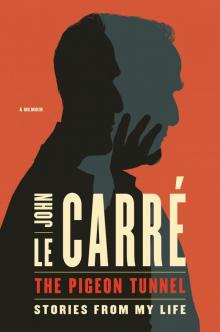 The Pigeon Tunnel: Stories From My Life
The Pigeon Tunnel: Stories From My Life Single & Single
Single & Single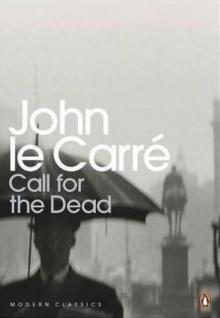 The Spy Who Came in From the Cold
The Spy Who Came in From the Cold The Looking Glass War
The Looking Glass War The Night Manager
The Night Manager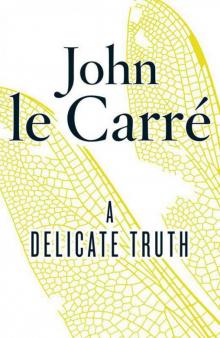 A Delicate Truth
A Delicate Truth A Perfect Spy
A Perfect Spy The Little Drummer Girl
The Little Drummer Girl Absolute Friends
Absolute Friends A Murder of Quality AND Call for the Dead
A Murder of Quality AND Call for the Dead The Russia House
The Russia House The Tailor of Panama
The Tailor of Panama Tinker, Tailor, Soldier, Spy
Tinker, Tailor, Soldier, Spy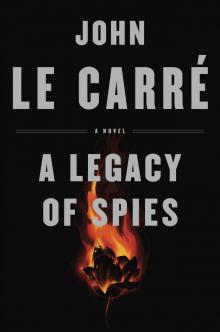 A Legacy of Spies
A Legacy of Spies The Mission Song
The Mission Song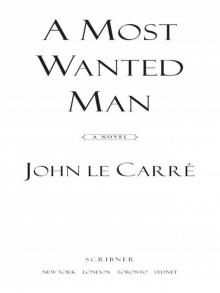 A Most Wanted Man
A Most Wanted Man John Le Carré: Three Complete Novels
John Le Carré: Three Complete Novels The Secret Pilgrim
The Secret Pilgrim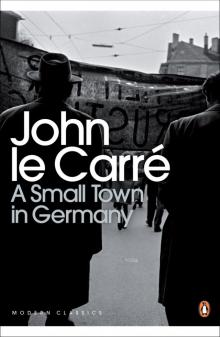 A Small Town in Germany
A Small Town in Germany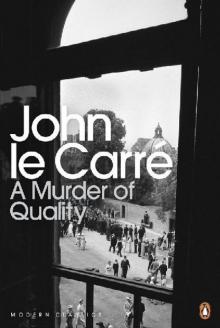 A Murder of Quality
A Murder of Quality Smiley's People
Smiley's People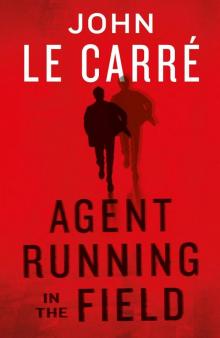 Agent Running in the Field
Agent Running in the Field The Spy Who Came in from the Cold s-3
The Spy Who Came in from the Cold s-3 The Pigeon Tunnel
The Pigeon Tunnel The Russia House - 13
The Russia House - 13 The Honourable Schoolboy
The Honourable Schoolboy Call For The Dead s-1
Call For The Dead s-1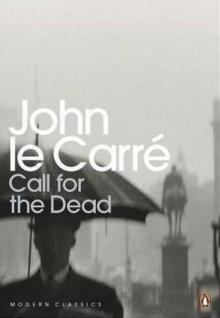 Call for the Dead
Call for the Dead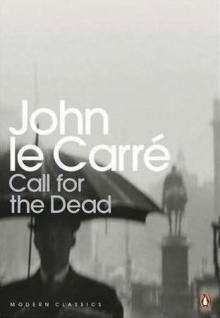 Call for the Dead - 1
Call for the Dead - 1